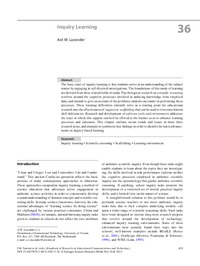Inquiry LearningArd W. Lazonder
Zu finden in: Handbook of Research on Educational Communications and Technology (Seite 453 bis 464), 2014
|
 |
 Diese Seite wurde seit 2 Jahren inhaltlich nicht mehr aktualisiert.
Unter Umständen ist sie nicht mehr aktuell.
Diese Seite wurde seit 2 Jahren inhaltlich nicht mehr aktualisiert.
Unter Umständen ist sie nicht mehr aktuell.
 Zusammenfassungen
Zusammenfassungen
 The basic tenet of inquiry learning is that students arrive at an understanding of the subject matter by engaging in self-directed investigations. The foundations of this mode of learning are derived from three related fields of study. Psychological research on scientific reasoning revolves around the cognitive processes involved in inducing knowledge from empirical data, and intends to give an account of the problems students encounter in performing these processes. These learning difficulties (should) serve as a starting point for educational research into the effectiveness of support or scaffolding that can be used to overcome known skill deficiencies. Research and development of software tools and environments addresses the ways in which this support can best be offered to the learner so as to enhance learning processes and outcomes. This chapter outlines recent trends and issues in these three research areas, and attempts to synthesize key findings in order to identify the latest advancements in inquiry-based learning.
The basic tenet of inquiry learning is that students arrive at an understanding of the subject matter by engaging in self-directed investigations. The foundations of this mode of learning are derived from three related fields of study. Psychological research on scientific reasoning revolves around the cognitive processes involved in inducing knowledge from empirical data, and intends to give an account of the problems students encounter in performing these processes. These learning difficulties (should) serve as a starting point for educational research into the effectiveness of support or scaffolding that can be used to overcome known skill deficiencies. Research and development of software tools and environments addresses the ways in which this support can best be offered to the learner so as to enhance learning processes and outcomes. This chapter outlines recent trends and issues in these three research areas, and attempts to synthesize key findings in order to identify the latest advancements in inquiry-based learning. Dieses Kapitel erwähnt ...
Dieses Kapitel erwähnt ...
 Zitationsgraph
Zitationsgraph
 Zitationsgraph (Beta-Test mit vis.js)
Zitationsgraph (Beta-Test mit vis.js)
 6 Erwähnungen
6 Erwähnungen 
- Ten steps to complex learning - A Systematic Approach to Four-Component Instructional Design (Jeroen van Merriënboer, Paul A. Kirschner) (2007)

- Handbook of Research on Educational Communications and Technology - 4th edition (J. Michael Spector, M. David Merrill, Jan Elen, M. J. Bishop) (2014)
- 40. Support Device Usage (Geraldine Clarebout, Jan Elen, Lai Jiang, Griet Lust, Norma A. Juarez Collazo)


- 40. Support Device Usage (Geraldine Clarebout, Jan Elen, Lai Jiang, Griet Lust, Norma A. Juarez Collazo)
- Mobile Inquiry-Based Learning with Sensor-Data in the School - Effects on Student Motivation (Olga Firssova, Marco Kalz, Dirk Börner, Fleur Prinsen, Ellen Rusman, Stefaan Ternier, Marcus Specht) (2014)


- Second Handbook of Information Technology in Primary and Secondary Education (Joke Voogt, Gerald Knezek, Rhonda Christensen, Kwok-Wing Lai) (2018)


- Personalisiertes Lernen mit digitalen Medien - Ein roter Faden (Wayne Holmes, Stamatina Anastopoulou, Heike Schaumburg, Manolis Mavrikis) (2018)


- Lernen mit Bildungstechnologien - Praxisorientiertes Handbuch zum intelligenten Umgang mit digitalen Medien (Helmut M. Niegemann, Armin Weinberger) (2019)
- 20. Computer-unterstützte kooperative Lernszenarien (Armin Weinberger, Christian Hartmann, Lara Johanna Schmitt, Nikol Rummel)


- 20. Computer-unterstützte kooperative Lernszenarien (Armin Weinberger, Christian Hartmann, Lara Johanna Schmitt, Nikol Rummel)
 Anderswo finden
Anderswo finden
 Volltext dieses Dokuments
Volltext dieses Dokuments
 |  Inquiry Learning: Artikel als Volltext bei Springerlink ( Inquiry Learning: Artikel als Volltext bei Springerlink ( : :  , 690 kByte; , 690 kByte;  : :  2020-11-28) 2020-11-28) |
 Anderswo suchen
Anderswo suchen 
 Beat und dieses Kapitel
Beat und dieses Kapitel
Beat hat Dieses Kapitel während seiner Zeit am Institut für Medien und Schule (IMS) ins Biblionetz aufgenommen. Beat besitzt kein physisches, aber ein digitales Exemplar. Eine digitale Version ist auf dem Internet verfügbar (s.o.). Aufgrund der wenigen Einträge im Biblionetz scheint er es nicht wirklich gelesen zu haben. Es gibt bisher auch nur wenige Objekte im Biblionetz, die dieses Werk zitieren.











 Biblionetz-History
Biblionetz-History